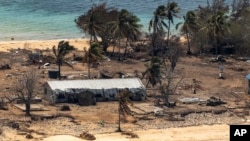The United Nations is urging the international community to maintain its support of the South Pacific island nation, Tonga, a month after a devastating volcanic eruption and tsunami.
On January 15, a massive undersea volcano unleashed tsunami waves that slammed into the Tongan archipelago. Foreign diplomats said that while the loss of life and the number of serious injuries were small, the damage to property was “catastrophic.”
Much of the South Pacific nation has been blanketed with volcanic ash.
The United Nations has described the international response to the disaster as “fantastic.” Aid has been delivered by air and sea by Australia, New Zealand, China, Britain and the European Union.
But it has been a relief operation like no other. Authorities in Tonga demanded that aid shipments be contactless to avoid the spread of the coronavirus in a country that had previously recorded just a single infection last year with no deaths recorded so far.
However, case numbers have now risen, and the recovery effort is being hampered by a worrying outbreak of COVID-19.
About 141 cases are now confirmed across several villages. The WHO says as of January 4 this year, more than 130,000 vaccine doses have been administered.
The U.N. resident coordinator responsible for Tonga, Sanaka Samarasinha, told Radio New Zealand the international aid effort must continue.
“We need to strengthen national capacities to respond. We need to pre-position supplies as much as possible, ideally in the Pacific, and we need to make sure that we build stronger networks, more resilient networks of communication so that we are able to provide some of the technical support that may not be available in each of these small countries virtually at times of such crises.”
The World Bank has estimated the damage to buildings, communications and infrastructure was the equivalent of 18% of Tonga’s gross domestic product or annual income. However, broader economic losses on farming and tourism are not reflected in the bank’s report.
Tonga has a population of just over 100,000. It closed its borders in early 2020 as the coronavirus pandemic swept the globe.
Entry to foreign nationals continues to be subject to strict biosecurity conditions.




